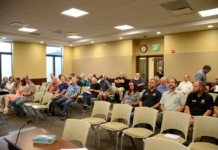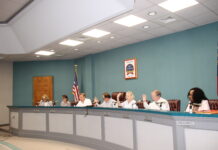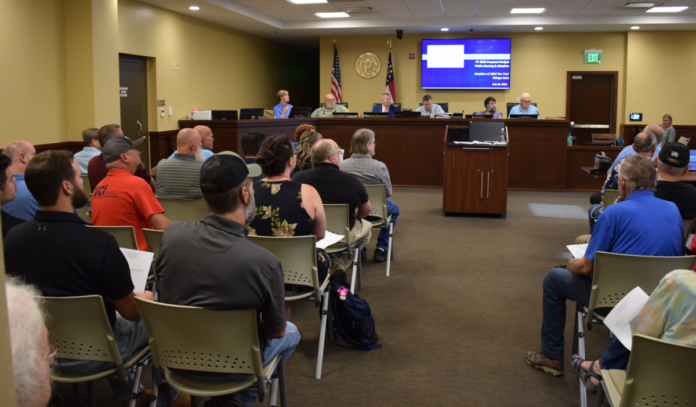
Citizens spoke out during the budget public hearing before the Habersham County Commission voted to pass the budget during Monday’s called meeting. The Jury Assembly Room at the courthouse was nearly full of property owners, and several spoke during the public hearing. Two common themes were prevalent. The first was how the budget could be cut. The second was how to distribute employee pay raises.
County vehicles
Bob Lonergan of Cornelia spoke about cutting spending starting with a direct question to the commission. “I would like to know how much you spend on personal vehicles for county employees,” he asked. Commission Chairman Ty Akins responded that the information was not readily available but he could get it for him.
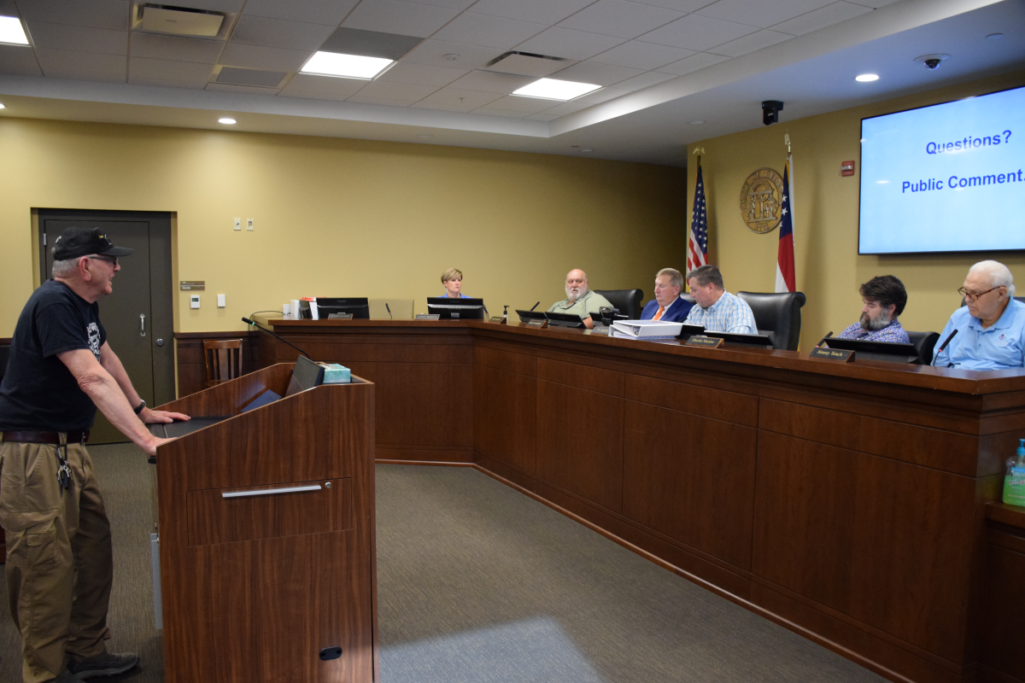
“Previously, I mentioned it at another meeting and I thought maybe you might have an answer now,” Lonergan said. He added, “But that would be a good place to cut some spending right there.”
Lonergan gave his opinion about raises for employees being a merit or a cost of living raise. “Merit raise is a scheme to beat people out of their raise,” he told the commissioners. He went on to tell them that he had been a victim of merit increases that he never actually received.
Spending
Teresa and Darryl Lewellan explained to the commission that they were like most people in the county who live paycheck to paycheck.
“We don’t want to be like Gwinnett County,” Teresa told the commission.
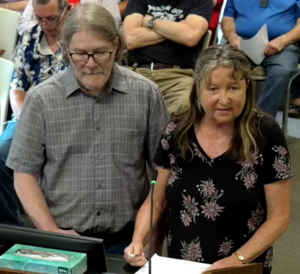
Lewallen referenced a few line items from the budget that she had printed out.
“The first one that stands out is the County Manager up $36,000. I don’t know how many people are in that office or its salaries or what, but I would cut out the additional amount at least,” she told the commission.
Lewallen referenced increases in the Tax Commissioner’s Office are up nearly $71,000. The increase in the Tax Assessor’s Office is up nearly $460,000, and the Recreation Department is up nearly $100,000. She also referenced the gymnastics program, questioning the number of people who benefit from the service.
After reflecting on the entire budget, “Spending is too much,” she told the commission.
Growth
During her remarks, Lewallen blamed growth for the budget increases.
“What we think, I think growth is driving this high budget. I think growth is driving it,” she said. “We need to put a moratorium on growth.”
Lewallen asked how to go about doing that, at least until the inland port is built.
Akins agreed with her that growth is driving the budget. She referenced where School Superintendent Matthew Cooper stated that he agreed that the growth is unsustainable.
Akins explained to Lewallen that placing a moratorium on development is difficult due to regulations recently approved by the state. However, a moratorium can be placed for specific reasons. He assured her that the county is currently looking at tightening up on its land use plan that had been lax for many years due to the rural nature of the county.
Akins informed her that the county had no control over the cities and they could approve developments without county involvement. He explained that most of the infrastructure is in the cities, and that is where the majority of the growth will occur.
Employee raises
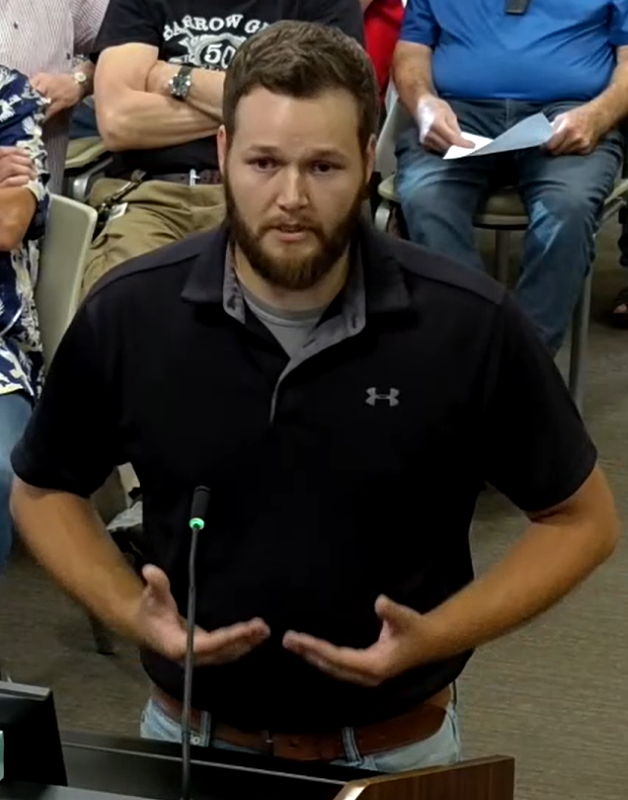
Cole Cleiman addressed the commission supporting employee pay raises. He told the commissioners that during COVID, employees were considered essential workers but since that time the public doesn’t hear that anymore.
“They are 100% essential workers.” he told the commission. “If we have 4% that has already been allotted for the budget, why don’t we just go ahead and give that 4% as a way to retain really, really good essential employees for this county,” Cleiman said.
He added, “I think we should support the people in the community that are supporting us every day.”
Budget unsustainable
Paula Hanington addressed the commission and pointed out that the budget had increased $27.5 million, nearly 50% over four years, since 2021. “That is unsustainable,” she told the commissioners. “Once it gets in that budget at a certain level, getting it out is like pulling teeth.”
Hanington has been an advocate for cutting spending, especially on programs that are not essential services. She assured the commission and those in the audience that she was not against the gymnastics program or the recreation department.
She suggested that the budget process be a little different next year and look at every line item closer to see what money could be clawed back in every department. Hanington expressed her concern about decisions that will have to be made in the near future that will require a lot of money and now is the time to make some tough decisions.
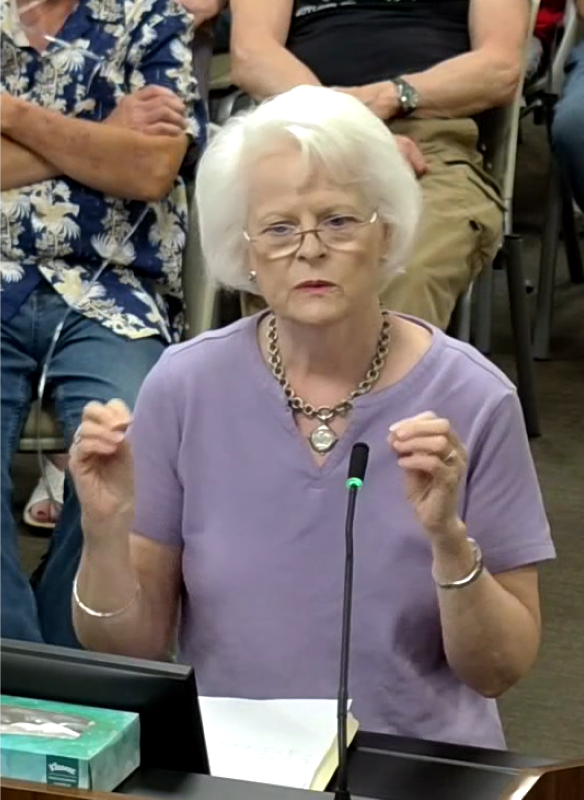
Several other citizens spoke to the commission during the budget public hearing, echoing some of the same sentiments. A few did speak in favor of retaining the gymnastics program but agreed that it did need to be looked at closer on a budgetary level.
Tax digest and services
After the budget public hearing, Akins explained that there have been studies in Georgia and across the country that show that as residential properties are developed, it costs more to provide services to those properties than the county receives in property tax revenue.
He agreed with those that spoke about growth in the county. He gave an example about the tax digest in 1990. That digest was 51% residential property. The most recent digest that the county received, residential property was 79%.
He expressed that as the county grows, it gets more difficult for the county to pay for the same level of services that it has provided over the years. “What we’re trying to do is keep the same level of services that we’ve been having from five years ago, ten years ago, 15 years ago but it’s becoming evermore difficult,” Akins said.
He added, ”We’re not adding anything. We’re not trying to add new programs.”





